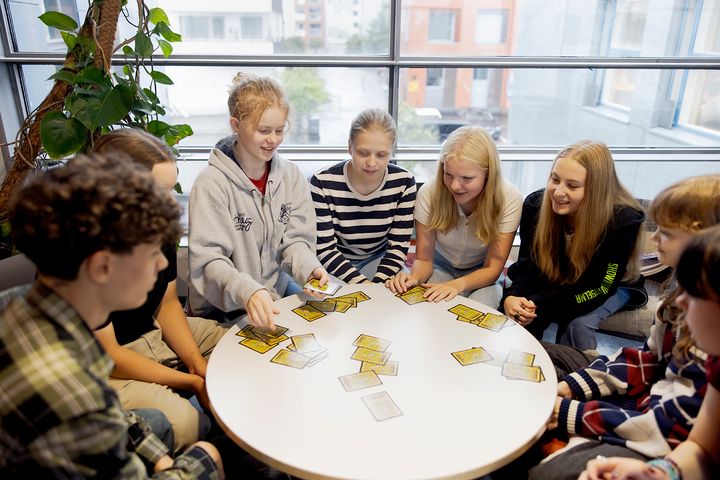Results of the OECD’s Survey on Social and Emotional Skills published: Helsinki included
The extensive survey measured the skills of 10- and 15-year-olds in task performance, emotion regulation, engaging with others, open-mindedness and collaboration. In addition to Finland, the survey was carried out in 14 other countries.

The data for the recent survey carried out by the Organisation for Economic Cooperation and Development (OECD) was collected in 2023. In Helsinki, responses to the survey were collected from approximately 2,300 10-year-olds and 2,500 15-year-olds. In addition to this, the researchers were provided with information about pupils’ home and school environments by teachers, principals and guardians.
The OECD’s Survey on Social and Emotional Skills uses an assessment framework of 15 social and emotional skills across five domains: task performance, emotion regulation, engaging with others, open-mindedness and collaboration.
Helsinki was also involved in the first round of the OECD Survey on Social and Emotional Skills carried out in 2019 (page in Finnish). The results can therefore be compared to the results from four years ago.
The self-reported social and emotional skills of children and adolescents in Helsinki have declined in both age groups compared to 2019. The skills that declined the most were curiosity, creativity, responsibility, tolerance and trust. By contrast, skills in stress resistance, assertiveness, empathy and persistence remained unchanged.
“The OECD is an important research partner for the City of Helsinki. Based on the findings of the previous survey, we have raised the importance of social and emotional skills to the same level as key competences and skills in the Education Department's new strategy entitled Helsinki Learns – Future Competences. This survey will play a major role in our monitoring of the development of Helsinki’s results during the strategy period and the focusing of our collaboration and development efforts regarding school education”, says Head of Education Division Satu Järvenkallas.
Boys have better stress resistance
The survey results indicate that there are clear gender differences in social and emotional skills. In both 2023 and 2019, 15-year-old boys in Helsinki reported having better emotion regulation skills, such as stress resistance, emotional control and optimism, than girls. Boys also reported higher skills in energy, assertiveness and trust than girls.
Gender differences among 15-year-olds in stress resistance, emotional control and energy increased in this survey round. Compared to the previous survey round, girls reported lower skills in emotional control and energy, whereas the levels reported by boys in these skills remained unchanged. Girls reported the same skill in stress resistance as in the previous survey round, whereas boys reported a higher skill in this area.
In the 2023 survey, 15-year-old girls exhibited lower skills in creativity, self-control and persistence than boys, even though this was not the case in 2019.
Some of the same gender differences were visible among 10-year-olds in Helsinki, but the differences were less pronounced and there were no significant changes. Among 10-year-olds, boys exhibited higher skills than girls in emotional control, energy and assertiveness.
Girls are more tolerant
Among 15-year-olds, girls reported higher skills in empathy and tolerance than boys in both the 2023 and 2019 surveys, with no significant changes in the differences. In both surveys, 10-year-old girls reported higher skills in empathy, tolerance, creativity and responsibility than boys.
Gender differences in social and emotional skills were more pronounced in Helsinki than in the other cities included in the survey. In Helsinki, gender differences were higher than the international average in stress resistance, emotional control, energy, optimism, assertiveness, creativity, empathy and tolerance. Especially in stress resistance, the gender difference was considerably higher among both age groups than in other countries on average.
“Four years ago, we were surprised by the extent to which the self-reported social and emotional skills of girls and boys corresponded to traditional gender roles. We are constantly developing methods and tools in order to better support the development of children and adolescents' skills throughout their study path. This development is carried out in collaboration with homes and other parties. The sense of safety, inclusion, community cohesion and agency of pupils also plays a key role in this work”, says Development Services Director Marjo Kyllönen.
Family socio-economic status affects social and emotional skills
The survey also revealed how the social and emotional skills of children and adolescents are affected by the socio-economic status of their families. In both age groups, pupils from socio-economically advantaged families exhibited higher levels of almost all social and emotional skills than pupils from less advantaged families.
According to the survey results, socio-economic status did not affect assertiveness among 10-year-olds or stress resistance and self-control among 15-year-olds in Helsinki.
Among 15-year-olds in Helsinki, socio-economic status had the greatest impact on curiosity, assertiveness, creativity, achievement motivation and sociability. The differences in curiosity, assertiveness and achievement motivation were also greater than on average across the participating cities.
The differences in self-reported assertiveness among 15-year-olds increased compared to 2019: socio-economically disadvantaged 15-year-olds now reported being less assertive than in the previous survey round, whereas the skill level of socio-economically advantaged 15-year-olds remained unchanged.
In the recent survey round, socio-economically disadvantaged 15-year-olds reported having lower skills in optimism, energy and sociability compared to their socio-economically advantaged peers. These differences were not noted in the 2019 survey.
“In recent years, increasing areal segregation has been clearly observable in Helsinki. This survey serves to further confirm this development. The Education Division tackles social exclusion and segregation in its everyday work. We respond to the root causes of segregation by ensuring equal opportunities for all pupils and by working together with families and neighbourhoods”, Järvenkallas says.
Social and emotional skills matter for academic success
In terms of pupils being late to school, Helsinki did not deviate from the international average, with 48% of 15-year-olds reporting that they had been late to school at least once during the past two weeks. Furthermore, 25% of 15-year-olds reported having skipped class and 19% reported having been absent for an entire school day during the past two weeks. The corresponding international averages were 29% and 31%, respectively, meaning that pupils in Helsinki are late from school and skip class less often than those living in the other cities that participated in the survey.
Social and emotional skills were clearly linked to academic success. Fifteen-year-olds who exhibited high skills in the domains of task performance and open mindedness and in empathy and emotional control had higher-than-average grades in mathematics, mother tongue and literature as well as visual arts. They also reported lower levels of being late to school and truancy.
Trust, optimism and assertiveness were linked to better grades in mother tongue and literature as well as mathematics. Optimism, trust, energy and stress resistance were linked to lower levels of being late to school and truancy.
In Helsinki, the relation between social and emotional skills and grades was more pronounced than on average across the participating cities.
Career expectations lower than in other countries
Social and emotional skills also affect adolescents’ career and future expectations. Of 15-year-olds in Helsinki, 63% think that they will pursue higher education, whereas internationally 84% of 15-year-olds think this way. Furthermore, 33% of 15-year-olds in Helsinki believe that they will work in managerial or expert positions in the future, whereas 57% of 15-year-olds in other countries who took part in the survey think so.
In Helsinki, the relation between social and emotional skills and career expectations is more pronounced than on average across the participating cities, with 15-year-olds who have higher skills in the domains of task performance and open-mindedness and in assertiveness reporting higher career expectations. Optimism, trust and sociability were also linked to high career expectations.
“Strengthening Helsinki residents’ trust in the future is one of the key goals of our new Helsinki Learns – Future Competences strategy. Based on the OECD’s survey, we know that the most important elements contributing to trust in the future are persistence, curiosity and optimism. It is therefore particularly important for us to develop these skills”, Kyllönen says.
Social and emotional skills matter for well-being
Good social and emotional skills in children and adolescents were related to good health habits, life satisfaction, current psychological well-being, satisfaction in relationships and body image. Almost all social and emotional skills were also linked to lower test and school anxiety.
In Helsinki, the links between well-being indicators and trust, responsibility, optimism and energy were more pronounced than on average across the participating cities.
Participants were selected at random
In addition to 10- and 15-year-olds in Helsinki, responses to the survey were collected from 10- and 15-year-olds in Bulgaria, Colombia, Chile, India, the United Arab Emirates, Italy, Japan, China, Indonesia, Mexico, Peru, Brazil, Spain and Ukraine.
In Helsinki, the survey was conducted at 106 comprehensive schools, general upper secondary schools and the Helsinki Vocational College and Adult Institute Stadin AO’s campus. The survey data was collected in September 2023. The participants were selected randomly by age group from the educational institutions participating in the survey.
The OECD will publish the results of the international survey on Friday 26 April at 11.30 at an event held in Sofia, Bulgaria. On Friday 26 April, Helsinki’s results will also be published on the City’s website.
Enquiries:
Marjo Kyllönen, Development services director
tel. 09 310 86208, marjo.kyllonen@hel.fi
Kasvatuksen ja koulutuksen toimiala huolehtii Helsingin kaupungin varhaiskasvatuksesta, esiopetuksesta, perusopetuksesta ja lukiokoulutuksesta, suomenkielisestä ammatillisesta koulutuksesta sekä vapaasta sivistystyöstä. Seuraa meitä @HelsinkiOppii, @tyovaenopisto, @Hforsarbis ja @StadinAO
Tilaa tiedotteet sähköpostiisi
Haluatko tietää asioista ensimmäisten joukossa? Kun tilaat tiedotteemme, saat ne sähköpostiisi välittömästi julkaisuhetkellä. Tilauksen voit halutessasi perua milloin tahansa.
Lue lisää julkaisijalta Helsingin kaupunki, kasvatuksen ja koulutuksen toimiala
OECD publicerade forskningsresultat om barns och ungas socioemotionella färdigheter: Helsingfors deltog26.4.2024 11:30:00 EEST | Tiedote
Storundersökningen mätte 10- och 15-åringarnas färdigheter i utförandet av uppgifter, regleringen av känslor, interaktionen med andra, öppenheten och samarbetet. I undersökningen deltog utöver Finland 14 andra länder.
OECD julkaisi tutkimustulokset lasten ja nuorten sosioemotionaalisista taidoista: Helsinki mukana26.4.2024 11:30:00 EEST | Tiedote
Suurtutkimus mittasi 10- ja 15-vuotiaiden taitoja tehtävien suorittamisessa, tunteiden säätelyssä, toiminnassa ja vuorovaikutuksessa muiden kanssa, avoimuudessa ja yhteistyössä. Tutkimuksessa oli Suomen lisäksi mukana 14 muuta maata.
Flickor och pojkar tävlar både i separata klasser och tillsammans i skolidrottsevenemang under läsåret 2024–202525.4.2024 10:36:16 EEST | Tiedote
År 2023 gjorde Helsingfors stads svenskspråkiga grundläggande utbildning ett försök med könsneutrala skolidrottstävlingar för barn i årskurs 3–6. Under läsåret 2024–2025 kommer individuella tävlingar att delas upp i flick- och pojkklasser. I lagtävlingar kommer alla att tävla tillsammans.
Tytöt ja pojat kilpailevat sekä erillisissä luokissa että yhdessä koulujen välisissä urheilutapahtumissa lukuvuonna 2024–202525.4.2024 10:36:16 EEST | Tiedote
Helsingin kaupungin ruotsinkielisessä perusopetuksessa kokeiltiin vuonna 2023 sukupuolineutraaleja oppilasurheilukilpailuja 3.–6. luokkien oppilaille. Lukuvuonna 2024–2025 yksilökilpailut jaetaan tyttöjen ja poikien luokkiin. Joukkuekilpailuissa kaikki kilpailevat yhdessä.
Päätöstiedote kasvatus- ja koulutuslautakunnan kokouksesta 23.4.202423.4.2024 17:14:31 EEST | Tiedote
Lautakunnan tiistaina 23. huhtikuuta pidetyn kokouksen päätöstiedote on julkaistu kasvatuksen ja koulutuksen toimialan verkkosivuilla. Kokouksen esityslista on saatavilla toimialan verkkosivuilta.
Uutishuoneessa voit lukea tiedotteitamme ja muuta julkaisemaamme materiaalia. Löydät sieltä niin yhteyshenkilöidemme tiedot kuin vapaasti julkaistavissa olevia kuvia ja videoita. Uutishuoneessa voit nähdä myös sosiaalisen median sisältöjä. Kaikki tiedotepalvelussa julkaistu materiaali on vapaasti median käytettävissä.
Tutustu uutishuoneeseemme